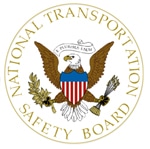 The National Transportation Safety Board Jan. 23 issued a series of recommendations (see Safety Recommendation Letters R-14-001-003 and R-14-004-006) to the Department of Transportation to address the safety risk of transporting crude oil by rail. In an unprecedented move, the NTSB is issuing these recommendations in coordination with the Transportation Safety Board of Canada.
The National Transportation Safety Board Jan. 23 issued a series of recommendations (see Safety Recommendation Letters R-14-001-003 and R-14-004-006) to the Department of Transportation to address the safety risk of transporting crude oil by rail. In an unprecedented move, the NTSB is issuing these recommendations in coordination with the Transportation Safety Board of Canada.
Crude oil shipments by rail have increased by over 400 percent since 2005, according to the Association of American Railroad’s Annual Report of Hazardous Materials. The NTSB is concerned that major loss of life, property damage and environmental consequences can occur when large volumes of crude oil or other flammable liquids are transported on a single train involved in an accident, as seen in the Lac Megantic, Quebec, accident, as well as several accidents the NTSB has investigated in the U.S.
“The large-scale shipment of crude oil by rail simply didn’t exist ten years ago, and our safety regulations need to catch up with this new reality,” said NTSB Chairman Deborah A.P. Hersman. “While this energy boom is good for business, the people and the environment along rail corridors must be protected from harm.”
The NTSB issued three recommendations to the Federal Railroad Administration and the Pipeline and Hazardous Materials Safety Administration, the first would require expanded hazardous materials route planning for railroads to avoid populated and other sensitive areas.
The second recommendation to FRA and PHMSA is to develop an audit program to ensure rail carriers that carry petroleum products have adequate response capabilities to address worst-case discharges of the entire quantity of product carried on a train.
The third recommendation is to audit shippers and rail carriers to ensure that they are properly classifying hazardous materials in transportation and that they have adequate safety and security plans in place.
The NTSB has investigated accidents involving flammable liquids being transported in DOT-111 tank cars, including the Dec. 30, 2013, derailment in Casselton, ND, and the June 19, 2009, derailment in Cherry Valley, IL. After the Cherry Valley accident, the NTSB issued several safety recommendations to PHMSA regarding the inadequate design and poor performance of the DOT-111 tank cars. The recommendations include making the tank head and shell more puncture resistant and requiring that bottom outlet valves remain closed during accidents. Although PHMSA initiated rulemaking to address the safety issue; it has not issued any new rules.
“If unit trains of flammable liquids are going to be part of our nation’s energy future, we need to make sure the hazardous materials classification is accurate, the route is well planned, and the tank cars are as robust as possible,” Hersman said.
The NTSB and the Transportation Safety Board of Canada issued these important safety recommendations jointly because railroad companies routinely operate crude oil unit trains in both countries and across the U.S-Canada border.
Association of American Railroads President and CEO Edward R. Hamberger responded to the NTSB’s recommendations around the safe movement of energy products by rail saying, “AAR is in full agreement with the safety boards’ recommendations today, as they align with our previous calls for increased federal tank car safety standards as well as the work the industry is undertaking with our customers and the Administration in an environment of shared responsibility for the safe movement of America’s energy products. Through these efforts and more, railroads are doing all they can to make a safe rail network even safer.”
Related News
- Assembly, No. 1672
- SMART-TD’s Public Comment Opposing CSX’s “Zero-to-Zero” Push
- Local 435, North Florida Building Trades win big on Jacksonville Jaguars stadium
- SMART Mobile App Flyer
- House Docket, No. 2682
- FRA Waivers for Autonomous Rail Testing
- Riders resist driverless technologies in Chicagoland
- Chicago Transportation Survey-Driverless Technology
- National Negotiations advance with NRLC meeting on Jan. 23
- Union organizes holiday cheer throughout the nation